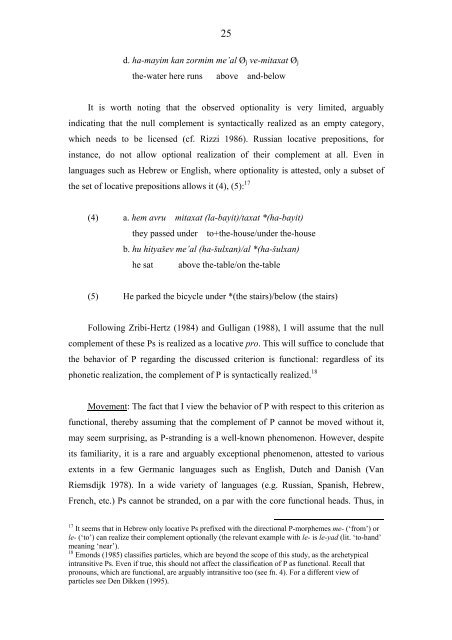The Category P Features, Projections, Interpretation
The Category P Features, Projections, Interpretation
The Category P Features, Projections, Interpretation
Create successful ePaper yourself
Turn your PDF publications into a flip-book with our unique Google optimized e-Paper software.
25<br />
d. ha-mayim kan zormim me’al Ø j ve-mitaxat Ø j<br />
the-water here runs above and-below<br />
It is worth noting that the observed optionality is very limited, arguably<br />
indicating that the null complement is syntactically realized as an empty category,<br />
which needs to be licensed (cf. Rizzi 1986). Russian locative prepositions, for<br />
instance, do not allow optional realization of their complement at all. Even in<br />
languages such as Hebrew or English, where optionality is attested, only a subset of<br />
the set of locative prepositions allows it (4), (5): 17<br />
(4) a. hem avru mitaxat (la-bayit)/taxat *(ha-bayit)<br />
they passed under to+the-house/under the-house<br />
b. hu hityašev me’al (ha-šulxan)/al *(ha-šulxan)<br />
he sat above the-table/on the-table<br />
(5) He parked the bicycle under *(the stairs)/below (the stairs)<br />
Following Zribi-Hertz (1984) and Gulligan (1988), I will assume that the null<br />
complement of these Ps is realized as a locative pro. This will suffice to conclude that<br />
the behavior of P regarding the discussed criterion is functional: regardless of its<br />
phonetic realization, the complement of P is syntactically realized. 18<br />
Movement: <strong>The</strong> fact that I view the behavior of P with respect to this criterion as<br />
functional, thereby assuming that the complement of P cannot be moved without it,<br />
may seem surprising, as P-stranding is a well-known phenomenon. However, despite<br />
its familiarity, it is a rare and arguably exceptional phenomenon, attested to various<br />
extents in a few Germanic languages such as English, Dutch and Danish (Van<br />
Riemsdijk 1978). In a wide variety of languages (e.g. Russian, Spanish, Hebrew,<br />
French, etc.) Ps cannot be stranded, on a par with the core functional heads. Thus, in<br />
17 It seems that in Hebrew only locative Ps prefixed with the directional P-morphemes me- (‘from’) or<br />
le- (‘to’) can realize their complement optionally (the relevant example with le- is le-yad (lit. ‘to-hand’<br />
meaning ‘near’).<br />
18 Emonds (1985) classifies particles, which are beyond the scope of this study, as the archetypical<br />
intransitive Ps. Even if true, this should not affect the classification of P as functional. Recall that<br />
pronouns, which are functional, are arguably intransitive too (see fn. 4). For a different view of<br />
particles see Den Dikken (1995).
















